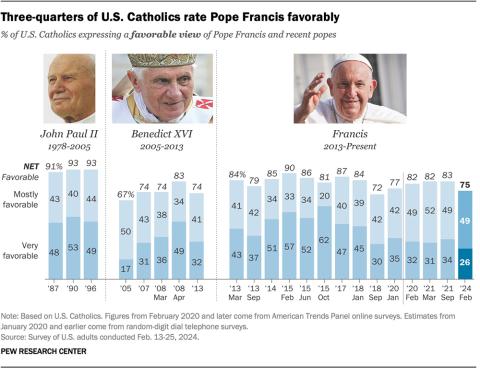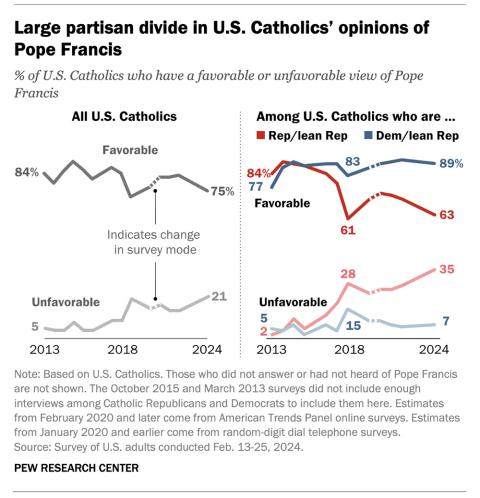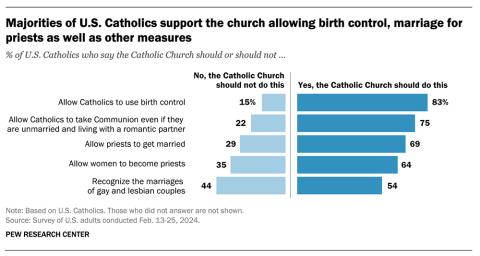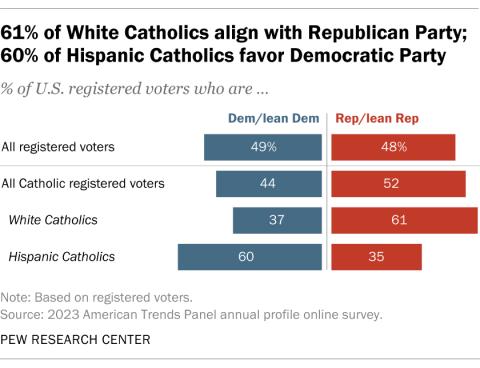US Catholic approval of Pope Francis dips among Republicans, Pew survey finds
Three-quarters of U.S. Catholics view Pope Francis favorably, but that figure is down 8 percentage points from 2021 and reflects growing polarization between Catholics who identify as Republicans and Democrats, a new Pew Research Center survey finds.
According to the new survey, about nine in 10 Catholics who are Democrats or lean progressive in their politics have positive attitudes toward the pope, compared with 63% of Republican or conservative-leaning Catholics.
"The partisan gap in views of Pope Francis is as large as it's ever been in our surveys," the Pew Research Center writes in its April 12 report, "Majority of U.S. Catholics Express Favorable View of Pope Francis."
Based on a Feb. 13-25 survey of 12,693 individuals — 2,019 of whom were Catholics — the Pew Research Center's findings provide a new data point to illustrate how conservative U.S. Catholics, once ardent defenders of the papacy, have become increasingly critical of Francis, an Argentine Jesuit who in March 2013 became the first pope from Latin America.
Alienated by Francis' pointed criticisms of capitalism, advocacy for climate change awareness, overtures to the LGBTQ community, and moves to permit civilly remarried Catholics in some cases to receive the Eucharist without an annulment, 35% of Republican or Republican-leaning Catholics in the United States now say they have an unfavorable view of the pope.
"This survey marks the first time that more than 28% of Catholic Republicans have expressed unfavorable views of Francis in roughly a dozen times we have asked this question since his papacy began in 2013," the Pew Research Center said.
In comparison, more than 90% of U.S. Catholics who are Democrats or "Democratic learners" hold positive views of Francis, who has differed from his immediate predecessors in part by not prioritizing the Catholic Church's moral teachings on "hot-button" issues such as abortion, contraception and homosexuality.
But though Francis has eschewed culture war rhetoric in emphasizing an ecclesiology that aligns with progressive readings of the Second Vatican Council, the pope has also been vocal at times in defending the church's more controversial teachings. On April 8, a highly-anticipated Vatican document declared that gender-affirming surgeries, gender theory and surrogate motherhood pose "grave threats to human dignity."
During his 11-year pontificate, Francis has often received favorable ratings of 80% or more from Catholics in the United States, according to the Pew Research Center. In 2015, Francis' overall favorability among U.S. Catholics reached its highwater mark at 90%.
While the conservative resistance to the Francis papacy has since contributed to a 15-point drop in the pope's favorable rating since 2015, the Pew Research Center found that Catholic Democrats' views of the current pontiff have barely budged. In its 2014 survey, 87% of those Catholics had favorable attitudes of Francis. The most recent survey pegs that figure at 89%.
One thing that Republican and Catholic Democrats seem to agree on is that they regard Francis as an "agent of change." According to the Pew Research Center, about 70% of all U.S. Catholics believe Francis signals a new direction for the Catholic Church, with 42% saying he represents "a major change."
As far as how the Catholic Church should change, large majorities of Catholics in the United States believe the church should lift its ban on birth control, allow unmarried cohabitating Catholics to receive Communion, permit priests to marry and ordain women to the ministerial priesthood, according to the Pew Research Center.
A little more than half of U.S. Catholics — 54% — say the church should recognize the civil marriages of same-sex couples, the survey said.
On abortion, the Pew Research Center survey indicates more evidence of a disconnect between U.S. Catholics and the hierarchy.
In November 2023, the U.S. Conference of Catholic Bishops voted to reaffirm the "threat of abortion" as the prelates' "preeminent priority" for their political guidance to Catholic voters in the year leading up to the 2024 presidential election.
But despite the bishops' decades of outspoken advocacy against abortion, the Pew Research Center's latest survey finds that about six in 10 Catholics believe abortion should be legal in all or most cases.
The survey also found that Catholics' views on abortion policy tend to align with their political leanings. Only 43% of Republican Catholics believe abortion should be legal in most or all cases, while 78% of Catholic Democrats hold that view. The survey indicated that 86% of non-Catholic Democrats believe abortion should be legal in most or all cases.
The Pew Research Center identified race, ethnicity, age and Mass attendance as variables when analyzing Catholics' political opinions. While about 61% of white Catholic registered voters lean toward the Republican Party, 60% of Hispanic Catholics said they identify with the Democratic Party.
But while Catholics who attend Mass at least weekly are more likely to oppose changing church teachings than those who seldom or never go to church, the survey still found that more than half of the Catholics in both groups support married priests, contraception and allowing unmarried cohabitating Catholics to receive Communion.





No comments:
Post a Comment